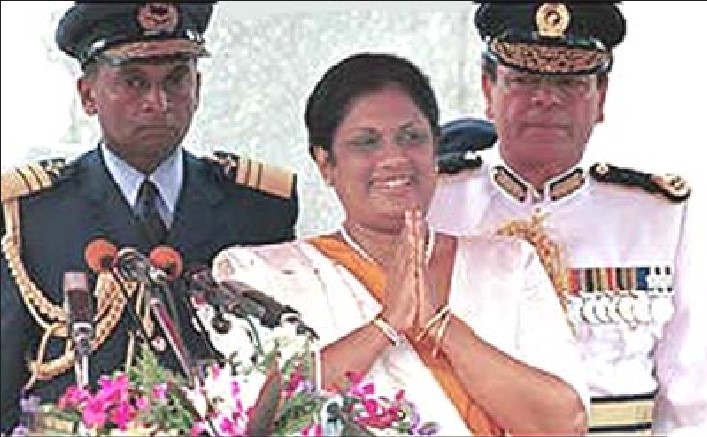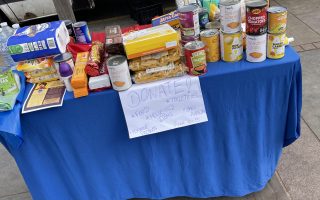On Thursday 16th February 2023 University of London School of Economics South Asia’s Centre plans on hosting a commemorative lecture on the emergence of Sri Lanka from colonisation which will be delivered by former president of Sri lanka, Chandrika Bandaranaike Kumaratunga, a perpetrator of the Tamil Genocide.

Former president Kumaratunga is the daughter of nationalist and left wing politician S.W.R.D Bandaranaike who is predominantly known for his political party ‘Sinhala Maha Sabha’ (1936-1951) and its objective to promote Sinhala Bhuddist culture in attempt to eliminate the Tamil identity. Following her father’s narrow minded doctrine, Kumaratunga took liberties in stripping away the rights of Tamils within their homeland through her supremacy between November 1994 and November 2005 as a president enforcing the cultural genocide.
Although Kumaratunga’s Manifesto explored the pursuit of peace between Tamils and the Sinhala government, her approach to this would seem rather questionable due to genocidal actions such as land grabs, massacres and hostilities that the Sri lankan government undertook whilst being under her surveillance.
Operation Riviresa was launched on 17th October 1995 to capture the North and East of the island through numerous attacks not on Tamil military bases but on refuge seeking Tamil civilians as well, directly contradicting her peace motto. Operation Riviresa was put into place to gain control and power of Jaffna, in other words to force the Sinhala Bhuddist ideology onto the Tamil civilians through the abuse of power. Tamils had always outwardly expressed their desire for an independent nation free from discrimination and oppression. Kumaratunga’s attempt to restore peace was by conducting numerous massacres and opposing the main objective Tamils had at the time – Tamil Eelam.
St Peter’s Church bombing at Navaly 1995 was a prevalently known massacre that was carried out under operation Riviresa with its estimated death toll of 120 mostly being women and children seeking refuge in the war. Not long after that was the Nagerkovil school massacre with 41 reported deaths, increased to 70 approximately, Kumarapuram massacre 1996, Thampalakamam massacre 1998 and Puthukkudiyiruppu massacre 1999.
The common resemblance here was that all these massacres targeted innocent Tamil civilians thus showing Operation Riviresa was not just an act of land grab but the attempt to accomplish total Tamil genocide.
Kumaratunga’s expression of peace was a mere charade to the world governments to cover the genocide that she had prepared to carry out against the North and East of the island.The international community were starting to see through her travesty as the Human Rights Watch’s report 1995 and Australian foreign Ministry 1996 went on to show their acknoweldgement to the cold blooded murder carried out at the Nagerkovil school massacre.
Her peacekeeping demeanour was just an act to cover up all the monstrosities carried on the island of Sri Lanka hence why later on when Kumaratunga proposed the idea of devolving power to the provinces, Tamils
did not feel as if they could blindly trust another false promise by yet another Sri Lankan official. It was purely propaganda to satisfy and deceive the international community.
Kumratunga’s actions point out the blatant fact that she is a war criminal that has not only failed to recognise the struggles of Tamils but actively contributed to the structural and cultural genocide of the Tamil Nation whilst manipulating her audience with her peace talks. We recommend the university invites Tamil representative Gajendrakumar Ponnambalam of the Tamil National People’s Front in Sri Lanka instead to talk about the Sri Lankan crisis.
As students we strongly condemn and oppose Kumaratunga’s invitation and delivery at the University of London School of Economics South Asia’s Centre’s Talk on Ceylon to Sri Lanka: A Journey in Nationhood.
LSE Tamil Society
St George’s University Of London Tamil Society
Tamil Students Initiative
Barts Tamil Society
York Tamil Society
Warwick Tamil Society
King’s College London Tamil Society
Kent Tamil Society
Brunel Tamil Society
Brighton and Sussex Tamil Society
University of Essex Tamil Society
Hertfordshire Tamil Society
Cardiff Tamil Society
Nottingham Tamil Society
Bristol Tamil Society
Southampton Tamil Society
Surrey Tamil Society
Demontfort Tamil Society
Middlesex Tamil Society
Queen Mary Tamil Society
Keele Tamil Society
Aston Tamil Society
Imperial Tamil Society
Greenwich Tamil Society


